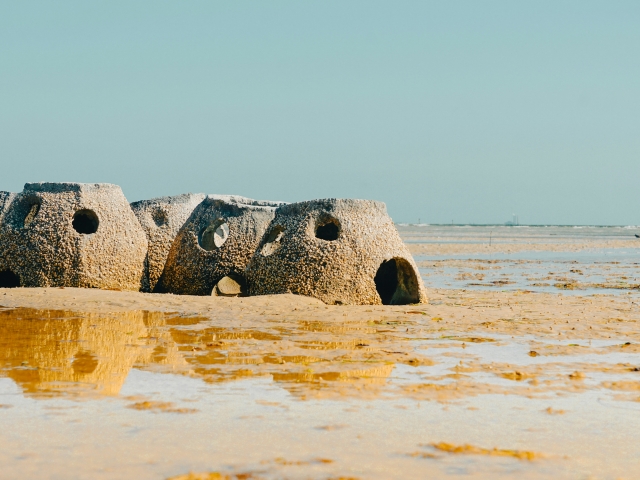Gulf Ecosystem Initiative
The Gulf of Mexico is a place where land, sea, people, and atmosphere are tightly coupled - where human impacts and climate change have a profound impact.

The Gulf Ecosystem Initiative is a $3.5 million partnership between the National Center for Ecological Analysis and Synthesis (NCEAS) in Santa Barbara, CA and the NOAA RESTORE Science Program to fund synthesis science and postdoctoral research. Working groups of scientists and decision makers will collaborate to solve pressing questions across the Gulf of Mexico. Synthesis science proposals and working groups will cover three main areas of research for decision making in the Gulf of Mexico: fisheries, climate change, and the ecological impacts of management.
Climate Change: The Gulf of Mexico is extremely vulnerable to climate change, especially sea level rise. Yet, despite decades of study in the region, we still lack fundamental understanding of feedback loops. How do human actions like oil and gas production change freshwater systems? How do coastal developments impact species migration? Working groups in the climate change focus will use climate data sets, models, and more to investigate questions like these that will better inform societal response.
Fisheries: Gulf of Mexico fisheries contribute millions of dollars to the economy each year, supplying 40% of our domestic seafood. There is a wealth of long-term data sets on these important fisheries and their environments, but for proper management we need to better understand the links between fish ecosystems and their functioning. Working groups in this fisheries focus will leverage existing partnerships, forge new connections, and tailor products for specific stakeholders.
Ecological impact of management actions: There have been numerous targeted actions in the Gulf of Mexico to address natural resource management, but how effective are they? This third focus area covers the ecological impact of past or current management actions at any scale in the Gulf of Mexico. By synthesizing available data, groups will gain a deeper understanding of the outcomes of management decisions, which can inform future or ongoing action.

Additional Information
Whether it is your first time proposing synthesis science or your tenth, you probably have questions about our new Gulf Ecosystem Initiative call for proposals - and we are here to answer them! Join us at this informational webinar, where we will review what NCEAS does, how working groups work, and tips for strong applications. There will be ample time for individual questions and answers.
View a recording of our 2025 Webinar on our YouTube channel.
From first time proposal writers to seasoned veterans, NCEAS staff is here to help you navigate the proposal process. Sign up for one on one support with our weekly, virtual office hours. Please include topics of potential discussion in the notes box so we can best prepare for our meetings.
Proposal Planning Guide
A working group is so much more than a collection of individuals working on a problem. We compiled best practices for team science, from germinating an idea to facilitating meetings. This guidance document is a great place to start!
Read the Proposal Planning Guide >>
Working Group Resources
If you are considering applying, or have already done so, this page offers a wide range of resources and relevant information to help you navigate the full working group process.
-
2023 Funded Proposals
Read more about the inaugural projects and postdoctoral scholars awarded through the Gulf Ecosystem Initiative, covering the impacts of severe weather and offshore wind development on fisheries.
-
2024 Funded Proposals
Read more about the second round of projects and a postdoctoral scholar, investigating the impacts of global shark and ray meat trade, the possible causes of aquatic thiamine (vitamin B1) deficiency, and the impacts of climate change and human disturbance to Gulf birds.


